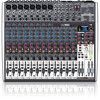Behringer XENYX X2222USB Manual - Page 12
Xpq To Main, Surround, Cd/tape Input, Cd/tape, Sub 1-2, Sub 3-4, Main Mix, Cd/tape To Main, Power - 16 input mixer
 |
View all Behringer XENYX X2222USB manuals
Add to My Manuals
Save this manual to your list of manuals |
Page 12 highlights
12 XENYX X2442USB/X2222USB/X1832USB/X1622USB User Manual The XPQ surround function can be enabled/disabled with the XPQ TO MAIN switch. This is a built-in effect that widens the stereo width, thus making the sound more lively and transparent. Use the SURROUND control to determine the intensity of this effect. 2.3.10 Level meter and monitoring VOICE CANCELLER Here, you have a filter circuitry that lets you almost entirely remove the vocal portion of a recording. The filter is constructed in such a way that voice frequencies are targeted without majorly affecting the rest of the signal. Additionally, the filter seizes only the middle of the stereo image, exactly there where the vocals are typically located. ◊ Connect the signal sources you wish to process using the Voice Canceller to the CD/TAPE INPUT connectors. The Voice Canceller circuitry is not X2442USB available for other inputs. Fig. 2.16: Control room and phones sections of the X2442USB Possible applications for the Voice Canceller are obvious: you can very simply stage background music for Karaoke events. Of course, you can also do this at home or at your rehearsal room before you hit the stage. Singers with their own band can practice singing difficult parts using a complete playback from a tape player or a CD, thus minimizing rehearsal time. CD/TAPE The CD/TAPE switch routes the signal from the CD/TAPE INPUT jacks to the level meter, the CONTROL ROOM OUT outputs and the PHONES jack-this is a simple way to check recorded signals via monitor speakers or headphones. 2.3.8 CD/Tape input, CD/tape output SUB 1-2 or SUB The SUB 1-2 switch routes subgroup 1-2 to the level meter, CONTROL ROOM OUT and phones. SUB 3-4 X2442USB The SUB 3-4 switch performs a similar function for subgroup 3-4 (X2442USB only). Fig. 2.15: 2-track connectors and lamp socket MAIN MIX CD/TAPE INPUT The CD/TAPE INPUT jacks (RCA) are designed to accept a 2-track recorder (e.g. DAT recorder), or they can be used as stereo line input. The output signal of a second XENYX or the BEHRINGER ULTRALINK PRO MX882 can also be connected here. If you connect the output of a hi-fi amplifier (with a source selection switch) to the CD/TAPE INPUT, you can easily listen to additional sources (e.g. cassette recorder, MD player, sound card, etc.). Using the voice canceller function (X1832USB only), you can process all signals being brought into your mixing console via these connectors. CD/TAPE OUTPUT These connectors are wired in parallel to the MAIN OUT and carry the main mix signal (unbalanced). Connect this to the inputs of your recording device. The final output level can be adjusted via the high-precision MAIN MIX fader. The MAIN MIX switch sends the main mix to the CONTROL ROOM OUT and the PHONES output as well as to the level meter. PHONES/CTRL ROOM Use this control to adjust the control room output level and the headphones volume. CD/TAPE TO MAIN When the CD/TAPE TO MAIN switch is depressed, the 2-track input is routed to the main mix and thus serves as an additional input for tape machines. You can also connect MIDI instruments or other signals here that do not require any further processing. At the same time, this switch disables the main mix to tape output link. POWER ◊ If you connect a compressor or a noise gate post 2-track output, the main mix fader will probably not be able to create a satisfactory fade-out effect. The blue POWER LED indicates that the device is switched on. +48 V 2.3.9 Lamp socket (X2442USB only) Use this BNC socket to connect a gooseneck lamp (12 V DC, max. 0.5 A). The red "+48 V" LED lights up when phantom power is switched on. Phantom power is required to operate condenser microphones. ◊ While phantom power is switched on, do not connect or disconnect microphones on the mixer (or the stagebox/wallbox). Connect any micro-phones before switching on phantom power. Additionally, monitor/PA speakers should be muted before you activate the phantom power supply. After switching on, wait approx. one minute before adjusting the input gain so that the system has time to stabilize.















